The Chariots of War.
Page 10
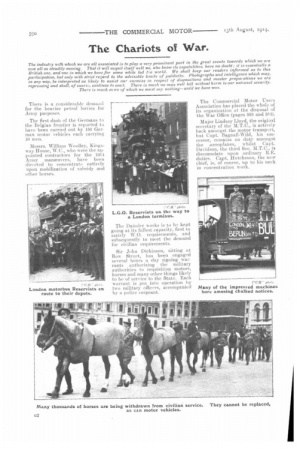
Page 11
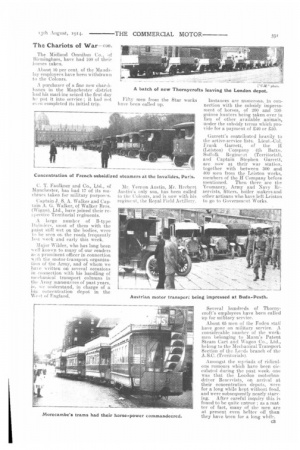
Page 12
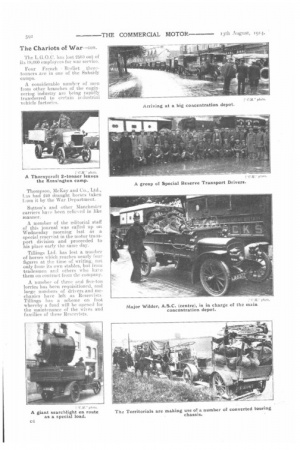
Page 13
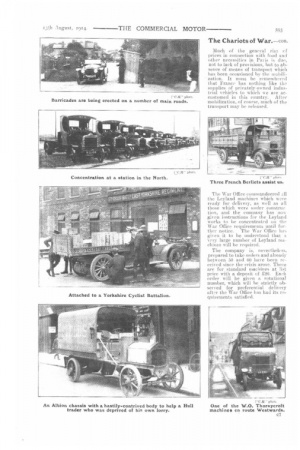
Page 14

Page 15
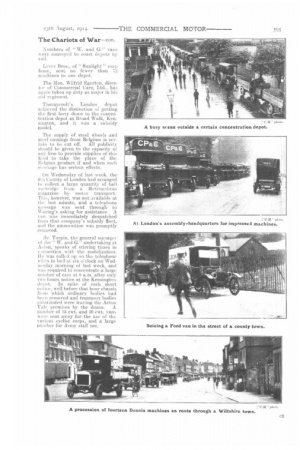
Page 16
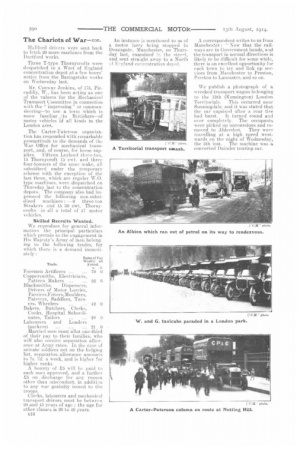
If you've noticed an error in this article please click here to report it so we can fix it.
The industry with which we are all associated is to play a very prominent part in the peat events towards which we are now all so steadily moving. That it will acquit itself well we, who know its capabilities, have no doubt; it is essentially a British one, and one in which we have for some while led ti.e world. We shall keep our readers informed as to this participation, but only with strict regard to the advisable limits of publicity. Photographs and intelligence which may, in any way, be interpreted as likely to assist our enemies in respect of dispositions and master prepaiations ue are repressing and shall, of emirs..., continue to omit. There is much we may well tell without harm to our national security.
There is much m)re of which we must say nothing—until we have won.
There is a considerable demand for the heavier petrol lorries for Army purposes.
The first dash of the Germans to the Belgian frontier is reported to have been carried out by 150 German motor vehicles each carrying 10 men.
Messrs. William Woolley, Kingsway House, W.C., who were the appointed contractors for the 1914 Army manceuvres, have been directed to concentrate entirely upon mobilization of subsidy and other horses. The Daimler works is to he kept going at its fullest capacity, first to satisfy W.O. requirements, and subsequently to meet the demand for civilian requirements.
Sir John Dickinson, sitting at Bow Street, has been engaged several hours a day signing warrants authorizing the military authorities to requisition motors, horses and many other things likely to be' of service to the State. Each warrant is put into operation by two military officers, accompanied by a police sergeant. The Commercial Motor Users Association has placed the whole of its organization at the disposal of the War Office (pages 58:3 and 5S(3).
Major Lindsay Lloyd, the original secretary of the M.T.C., is actively back amongst the motor transport, but Capt. Bagnall-Wild, his successor, remains on duty amongst the aeroplanes, whilst Capt. Davidson, the third Sec. M.T.C., is disconsolate upon ordinary RE. duties. Capt. Hutcheson, the new' chief, is, of course, up to his neck in concentration work. The Midland Omnibus Co.. of Birmingham, have had 100 of Co., horses taken.
About 10 per cent of the Mandslay employees have been withdrawn to the Colours.
A purchaser of a fine new char-h.banes in the Manchester district had his machine seized the first day he put it into service ; it had net i‘n completed its initial trip.
C. T. Faulkner and Co., Ltd., of Manchester, has had 17 of its machines taken for military purposos.
Captain J. S. A. Walker and Captain A. G. Walker, of Walker Bros. (Wigan), Ltd., have joined their rei_peetive Territorial regiments.
A large number of B-type Daimlers, most of them with the paint still wet on the bodies, were to be seen on the roads frequently Let week and early this week.
Major Wilder, who has long been well known to many of our readers as a prominent officer in connection ith the motor-transport organizathin of the Army, and of whom we have written on several occasions ill connection with his handling of mCchanical transport columns in the Army ma,noeuvres of past years, is. we understand, in charge of a big concentration depot in the West of England. Fifty men from the Star works have been called up.
Mr. Vernon Austin, Mr. Herbert Austin's only son, has been called Lo the Colours, and is now with his regiment, the Royal Field Artillery.
instances are numerous, in connection with the subsidy impressment of horses, of 200 and 300guinea hunters being taken over in lieu of other available animals, under the subsidy terms which provide for a payment of RAO or £50.
Garrett's contributed heavily to the active-service lists. Lieut.-Col. Frank Garrett, of the H (Leiston) Company 4th Battn.
Suffolk Regime it (Territorial), and Captain Stephen Garrett, are now at their war station, together with between 300 and 400 men from the Leiston works, members of the H Company before mentioned. Then there are the Yeomanry, Army and Navy 'Reservists, fitters, boiler makers and other artisans who have left Leiston to go to Government Works.
Several hundreds of Thornycroft's employees have been called up for military service.
About 65 men of the Foden stair have gone on military service. A considerable number of the workmen belonging to Mann's Patent Steam Cart and Wagon Co., Ltd., belong to the Mechanical Transport Section of the Leeds branch of the A.S.C. (Territorials).
Amongst the myriads of ridiculous rumours which have been circulated during the past week, one was that the London motorbus. driver Reservists, on arrival at their concentration depots, were for a long while kept without food, and were subsequently nearly starv
ing. After careful inquiry this is found to be quite untrue ; as a matter of fact, many of the men are at present even better off than they have been for a long while. The L.G.O.C. has lost 2503 out of its 18,000 employees for war service.
Four French Bet'liet threetonners are in one of the Subsidy camps.
A considerable number of men from other branches of the engineering industry are being rapidly transferred to certain irdustriai vehicle factories.
Thompson, McKay and Co., Ltd., Las had 240 draught horses taken from it by the War Department.
Sutton's and other Manchester carriers have been relieved in like manner.
A member of the editorial staff of this journal was called up on Wednesday morning last as a. special reservist in the motor transport division and proceeded to his place early the same day.
Tillings Ltd. has lost a number of horses which reaches nearly four figures at the time of writing, not only from its own stables, but from tradesmen and others who have them on contract from the company.
A number of three and five-ton lorries has been requisitioned, and large numbers of drivers and mechanics have left. as Reservists. Tilhngs has a scheme on foot whereby a fund will be opened for the maintenance of the wives and families of these Reservists. Much of the general rise ef prices in connection with food and other necessities in Paris is due, not to lack of provisions, but to absence of means of transport which has been occasioned by the mobilization. It must be remembered that France has nothing like thz-, supplies of privately-owned industrial vehicles to which we are ac• customed in this country. After mobilization, of course, much of the transport may be released.
The War Office commandeered ill the Leyland machines which were ready for delivery, as well as all those which were under construe tion, and the company has now given instructions for the Leyland works to be concentrated on the War Office requirements until fur ther notice. The War Office has given it to be understood that a very large number of Leyland machines will be required.
The company is, nevertheless, prepared to take orders and already between .50 and (30 have been received since the crisis arose. These are for standard machines at list price with a deposit of £20. Each order will be given a rotational number, which will be strictly observed for preferential delivery aft.;1. the War Office has had its requirements satisfied. The first London motorbus service cancelled owing to the war was that of the single-deckers on the Penge and Bromley service.
At the moment there is an almost entire absence of mechanical haulage vehicles in certain districts of Lancashire and Scotland.
In respect of the Northern concentrations of subsidy and im• pressed machines, exceptional care has been taken in regard to the giouping and classification.
All the single-deckers working through the Blackwell Tunnel– :35 in number—were converted to motor ambulances for the Admiralty and dispatched to Chatham within 26 hours of their being stopped on the road.
About a thousand employees of the Dunlop Rubber Co., Ltd., haVe been called up for active service. During their absence the company will pay half wages to the families of all the married men, whose places will also be kept open for thern.
The first batch of converted London omnibuses was inspected at the War Office on Sunday last. The bodies have, of course, been removed, and serviceable transportwagon bodies, painted grey, have taken their places. A number of other London motorbus chassis have been adapted for various purposes.
Upon arrival at certain depots, difficulty was found in providing the men with food, and in one ease the local vicar opened a small church and supplied coffee and food at intervals to the motor drivers. The trouble was accentuated in one case by the fact that the local shopkeepers would enly supply dock bands with food.
The late German Ambassador, Prince Liehnowsky, with the Princess motored from the Embassy to Liverpool Street Station, on Thursday, the 6th inst. ; the staff went in six motorbuses. A number of stranded German tourists were also included in the party. The personal baggage was taken away on 10 large horsed lorries. Numbers of "AV. and 0." vans were conveyed to coast depots by
Lever Bros., of " Sunlight." soap fame, sent no fewer than 72 machines to one depot,
The Hon. Wilfrid Egerton, director of Commercial Cars, Ltd., has again taken up duty as major in his olil regi m ent.
Thrornyeroft's London depot achieved the distinction of.getting the first lorry down to the concentration depot at Broad Walk, Kensington, and it was a subsidy model.
The supply of steel wheels and steel castings from Belgium is cer
tain lo be cut off. All publicity should be given to the capacity of any firm to provide supplies of this kind to take the place of the Belgian product if and when such shortage has serious effects.
On Wednesday of last week, the Ott County of London had arranged to collect a large quantity of bail cartridge from a Metropolitan magazine by motor transport. This., however, was not available at the last minute, and a telephone nassage was sent through to Waring's asking for assistance. A van was immediately despatched from that company's subsidy fleet, and the ammunition was promptly removed.
Mr. Turpin, the general manager of the " W. and G..' undertaking at Acton, speaks of stirring times in connection with the mobilization. Ile was called up 0r) the telephone when in heel at six o'clock on Wednesday morning of last week, and was required to concentrate a large number of cars at 8 a.m, after only two hours notice at the Kensington depot. In spite of such short nn i ice, well before that hour chassis front which ordinary bodies ',ad been removed and transport bodies substituted were leaving the Acton Vale premises by the dozen. A number or 15 cwt. and 30 cwt. vans were sent away for the use of the various cyclist corps, and a large rancher for Army staff use.
HaIlford drivers were sent back to fetch 20 more machines from the Dartford works.
Three T-type Thornycrofts were despatched to a West of England concentration depot at a few hours' notice from the Basingstoke works on kVednesday last.
Mr. Conway Jenkins, of 175, Piccadilly, W., has been acting as one of the valuers for the Mechanical Transport Committee in connection with the " impressing " or commandeering—to use a term which is more familiar to Britishers—of motor vehicles Of all kinds in the London area.
The Carter-Paterson organization has responded with remarkable promptitude to the demands of the War Office for mechanical transport, and, of course, for horse sup plies. Fifteen Leyland three-ton, 15 Thornycroft 15 cwt. and three four-tonners of the same make, all subsidized under the temporary scheme with the exception of the last three, which are regular W.O. type machines, were dispatched on Thursday last to the concentration depots. The company also had impressed the following non-subsidized machines : —9 three-ton Strakers and 15 30 cwt. Thornycrofts in all a total of 57 motor vehicles.
Skilled Recruits Wanted.
We reproduce for general information the principal particulars which pertain to the engagement in His Majesty's Army of men belonging to the following trades, for which there is a demand immediately :
Rates of Pay Weekly LII
Trade. Found.
Foremen Artificers ... ... 70 0 Coppersmiths, Electricians, Pattern Makers ... ... 52 6 Blacksmiths, Dispensers, Drivers of Motor Lorries, Farriers,Fitters,Moulders, Painters, Saddlers, Turn ers, Wheelers' 0 Bakers, Butchers, Clerks., 42 Cooks, Hospital Subordi nates, Tailors ... 28 0 Labourers and Loaders
(packers) ... ... 21 0 Married men must allot one-third of their pay to their families, who will also receive separation allowance at Army rates. In the case of nrivate soldiers not on the lodging separation..allowance an-loners to 7s. 7d. a week, and is higher for higher ranks.
A bounty of £5 will be paid to each man approved, and a further Rfi on discharge for any reason other than misconduct, in additi-m to any war gratuity issued to the troops.
Clerks, labourers and mechanied transport drivers must be between 20 and 4n years of age ; the age for other classes is 20 to 40 years. An instance is mentioned to us of a motor lorry being stopped in Deansgate, Manchester, on Thursday last, examined n the street, and sent straight away to a North ef Ergland concentration depot.. A correspondent writes to us from Manchester " Now that the railways are in Government hands, and the transport in normal directions is likely to be difficultfor some while, there is an excellent opportunity for each town to try and link up services from Manchester to Preston, Preston to Lancaster, and so on.
We publish a photograph of a wrecked transport wagon belonging to the 13th (Kensington) London Territorials. This occurred near Stumingdale, and it was stated that the ear capsized after it rear tire had burst. It turned round and over completely. The occupants were picked up unconscious and removed to Aldershot. They were (ravelling at a high speed westwards on the night of Wednesday, the 5th inst. The machine was a converted Daimler touring car.


















